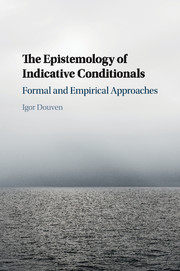7 - Progress?
Published online by Cambridge University Press: 05 November 2015
Summary
I am not under the illusion that I have been able to settle once and for all any of the questions that were listed at the beginning of this book. But nothing of that order was promised or could have reasonably been expected. At the same time, I do believe that some progress has been made in becoming clearer on a number of those questions.
Until very recently, the epistemology of conditionals was, for the most part, a tale of two theses: Stalnaker's Hypothesis (SH) and Adams’ Thesis (AT). That the former is false and that the latter is true seemed to be the only two certainties in a sea of uncertainties and controversies. Neither “certainty” was backed by empirical evidence, and neither seemed to need such backing: the falsity of SH seemed to follow from indubitable formal results, and the truth of AT seemed a matter of course. It is more than ironic that, as we saw in Chapters 3 and 4, recent empirical results suggest that philosophers have gotten things wrong with respect to both claims: SH has been experimentally confirmed several times over, and in one experiment AT was refuted (which is refutation enough).
More specifically, and as explained in Chapter 3, whereas the data apparently in favor of SH might betray a systematic error in how people judge the probabilities of conditionals, or in how they determine conditional probabilities, or in both, further empirical research was seen to support a more charitable interpretation of those data, one that seeks fault rather with an assumption underlying the formal results that had been thought to undermine SH. Still more specifically, the presented results on the generalized version of SH lend credibility to a thesis that thus far many had considered to be no more than an interesting theoretical possibility, to wit, that the interpretation of the conditional-forming operator may vary from one belief state to another. Thus, the answer to the question of what the probabilities of conditionals are may be as simple as was believed before Lewis presented his triviality results: probabilities of conditionals equal conditional probabilities.
- Type
- Chapter
- Information
- The Epistemology of Indicative ConditionalsFormal and Empirical Approaches, pp. 173 - 176Publisher: Cambridge University PressPrint publication year: 2015



